|
|
|
Sort Order |
|
|
|
Items / Page
|
|
|
|
|
|
|
| Srl | Item |
| 1 |
ID:
017927
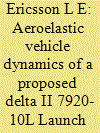

|
|
|
|
|
| Publication |
Jan-Feb 2000.
|
| Description |
28-38
|
|
|
|
|
|
|
|
|
|
|
|
|
|
|
|
| 2 |
ID:
124983
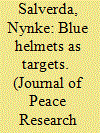

|
|
|
|
|
| Publication |
2013.
|
| Summary/Abstract |
A majority of UN peacekeeping operations deployed to civil wars face violent attacks by rebel groups. To date, the academic study of this type of violence has been very limited. This article is a first attempt to fill this gap. In particular, I aim to examine why rebel groups fight against peacekeepers in some cases, while not in others. I argue that since peacekeepers are mostly impartial but not neutral, they become an actor in a conflict and tend to protect the weaker side from total defeat. This implies that on the one hand, relatively weaker rebels will seek protection from the government by peacekeepers. On the other hand, relatively stronger rebels will challenge the peacekeepers in order to restrict their behavior and/or make them withdraw. If stronger rebels are successful in targeting the peacekeepers and the peacekeepers withdraw or alter their behavior, a victory for these rebel groups should become easier. Using novel data on violence against UN peacekeepers, I find that indeed, stronger rebel groups are more likely to fight against peacekeepers.
|
|
|
|
|
|
|
|
|
|
|
|
|
|
|
|
| 3 |
ID:
131014
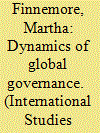

|
|
|
|
|
| Publication |
2014.
|
| Summary/Abstract |
It is hard to quarrel with Weiss and Wilkinson's argument that deeper investigation of global governance could have big payoffs, and the four "primary pursuits" or research tasks they sketch will interest many scholars in this field. My concern is that while Weiss and Wilkinson nicely describe the importance of these tasks, they offer only cursory suggestions about ways forward when they could do much more. Unlike Weiss and Wilkinson (hereafter W&W), I see a great deal of first rate work being done that speaks directly to issues they raise-how power is exercised globally,2 structures of global authority,3 increasing complexity,4 actor proliferation, and change. The problem, I would argue, is not that scholars are ignoring these issues, but that so much more could and should be done. In this short essay, I build on foundations laid by others to sketch more focused research agendas for global governance scholars in four areas to tackle some of the central questions W&W identify, with particular attention to their laudable interest in change.
|
|
|
|
|
|
|
|
|
|
|
|
|
|
|
|
| 4 |
ID:
160342
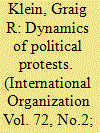

|
|
|
|
|
| Summary/Abstract |
The links between protests and state responses have taken on increased visibility in light of the Arab Spring movements. But we still have unanswered questions about the relationship between protest behaviors and responses by the state. We frame this in terms of concession and disruption costs. Costs are typically defined as government behaviors that impede dissidents’ capacity for collective action. We change this causal arrow and hypothesize how dissidents can generate costs that structure the government's response to a protest. By disaggregating costs along dimensions of concession and disruption we extend our understanding of protest behaviors and the conditions under which they are more (or less) effective. Utilizing a new cross-national protest-event data set, we test our theoretical expectations against protests from 1990 to 2014 and find that when protesters generate high concession costs, the state responds in a coercive manner. Conversely, high disruption costs encourage the state to accommodate demands. Our research provides substantial insights and inferences about the dynamics of government response to protest.
|
|
|
|
|
|
|
|
|
|
|
|
|
|
|
|
| 5 |
ID:
159048
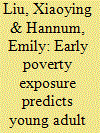

|
|
|
|
|
| Summary/Abstract |
Comparative research suggests that poverty in childhood, and especially in the early years, impedes educational attainment. With longitudinal data from China, we estimate hazard models of dropping out of school in young adulthood with two dynamic measures of childhood poverty: poverty spell indicators that distinguish poverty in early childhood, middle childhood, and adolescence, and poverty indices that measure the depth of poverty and distinguish chronic from transient poverty.
Four main results emerge: 1) Children who experience spells in poverty leave school at a higher rate than others, even adjusting for poverty in later periods; 2) Transient poverty is more widespread, and shows a greater negative association with school-leaving, than chronic poverty; 3) Early childhood poverty shows greater negative associations with education outcomes than poverty in later periods; and 4) Girls may be more susceptible than boys to early poverty. We further test two possible mechanisms of impact: early nutrition poverty and school fees. While lower protein intake at an early stage of life is related to poorer educational outcomes in young adulthood, adjusting for nutritional deprivation does not attenuate the associations of early transient income poverty. Results do not suggest that cohorts that experienced school-fee abolishment policies experienced different poverty effects than other cohorts.
|
|
|
|
|
|
|
|
|
|
|
|
|
|
|
|
| 6 |
ID:
132930
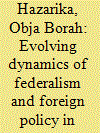

|
|
|
|
|
| Publication |
2014.
|
| Summary/Abstract |
Although, the central government in India has been constitutionally empowered to decide on foreign affairs, this article has attempted to portray that sub-national units have influenced and affected external engagements to a certain extent. The central government as well as foreign audiences have acknowledged the role of the states of India in external engagements and have often included them in discussions and negotiations relating to foreign affairs. Sub-national diplomacy has taken varied manifestations in India. First, states have embarked on economic diplomacy with foreign audiences. Secondly, states sharing an international border have influenced neighbourhood policy and thirdly, regional parties, which have served as coalition partners at the centre have often leveraged their status to exert pressure on the centre in certain foreign policy decisions. The centre, being the final authority on external affairs in India, must continue to conduct foreign policy with an aim to secure the national interest of the country as well as to ensure that the legitimate interests and concerns of the states are adequately accommodated.
|
|
|
|
|
|
|
|
|
|
|
|
|
|
|
|
| 7 |
ID:
083229
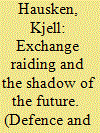

|
|
|
|
|
| Publication |
2008.
|
| Summary/Abstract |
Abstract A two-period exchange model is developed where production decisions in the first period determine the amount of resources available in the second period. Each agent allocates resources to defend its production and attack the production of the other agent. Production, conflict and exchange occur simultaneously in a dynamic model. This extends earlier exchange models, which are static and preclude defense and appropriation. The agents jointly determine price through their export decisions. Upon introducing exchange endogenously, raiding in the first relative to the second period decreases with growth, appropriation cost, and when the future becomes more important, and increases with defense cost, production cost, and usability of appropriation. Increasing the usability of appropriation and defense cost causes a transition from pure exchange via joint exchange and raiding to pure raiding. This implies that agents gradually substitute from defense to appropriation, they exchange less, and utility decreases. Utility isoquants in a usability of appropriation versus discount factor diagram are concavely increasing for joint exchange and raiding, and can be convexly decreasing for pure raiding. Cobb-Douglas utilities are assumed. The results are confirmed with CES utilities
|
|
|
|
|
|
|
|
|
|
|
|
|
|
|
|
| 8 |
ID:
184997
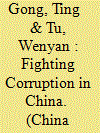

|
|
|
|
|
| Summary/Abstract |
This article provides an overview of the decades-long fight against corruption in China, focusing on its trajectory, dynamics, and impact. Corruption has long been a threat to China’s social stability, its economic development, and even the legitimacy of the regime. Equally notable are the numerous efforts made by successive generations of the Chinese leadership to control and prevent corruption. While goals may have remained the same across different periods, anti-corruption strategies and methods have changed considerably, moving from sporadic campaigns to more institutionalized methods and from power-driven rectification to rule-based integrity management. The current anti-corruption drive, launched after Xi Jinping took power at the 18th National Party Congress in 2012, not only has demonstrated novel features, suggesting a multi-pronged approach, but also is unprecedented in its breadth, depth, and severity. What are the dynamics of China’s fight against corruption? Has the increasingly intense crack-down been able to contain corruption? How can we understand the impact and effectiveness of anti-corruption enforcement in China? The six articles, including this one, in this special issue provide answers to these questions.
|
|
|
|
|
|
|
|
|
|
|
|
|
|
|
|
| 9 |
ID:
129682
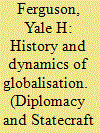

|
|
|
|
|
| Publication |
2014.
|
| Summary/Abstract |
Globalisation involves geographically wider transaction networks and has multiple interrelated dimensions. The globalisation process has geographical scope, volume and density of transactions, and a direction and pace of change. Globalization has a long history, and the local and the global have almost continuously interacted. Most forward changes have been incremental, and there have also been major reversals or almost complete system-breakdowns. There are numerous drivers of globalization of different types, persons, and groups with varying motives, and anonymous drivers like technology, weather, and disease. The article devotes most attention to a review of selected patterns and trends in contemporary globalisation These are climate change; demographic trends, income inequality, and migration; security concerns, technology, and peacekeeping; competing ideologies; the global economy, equities, trade, banking reform, and tax havens; and shifting power relationships among the United States, Europe, China, Japan, and Emerging Markets.
|
|
|
|
|
|
|
|
|
|
|
|
|
|
|
|
| 10 |
ID:
134086
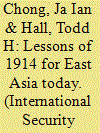

|
|
|
|
|
| Publication |
2014.
|
| Summary/Abstract |
The importance of World War I for understanding contemporary East Asia lies not in the ubiquitous analogy drawn between Anglo-German antagonism and contemporary U.S.-China relations, but rather in the more specific lessons the period preceding its outbreak offers concerning the sources of instability and conflict among states. More precisely, these lessons relate to the challenges posed by complex security arrangements, the dual-edged nature of nationalism, and the dangerous dynamics that can emerge during repeated crises. Appreciating how these factors contributed to mounting tensions and eventually the onset of war in Europe a century ago can enhance efforts to understand and manage tensions in East Asia today.
|
|
|
|
|
|
|
|
|
|
|
|
|
|
|
|
| 11 |
ID:
089580


|
|
|
|
|
| Publication |
2009.
|
| Summary/Abstract |
The goal of this study is to assess the dynamics of rural households' labor market participation in the wake of China's efforts to develop rural labor markets in a manner that is conducive to its transition to a market economy. Based on a theoretical model that emphasizes the impact of duration, i.e. of the number of years households spent part-time farming or full-time farming, respectively, we investigate the shifts between these two states. We also identify socioeconomic factors that determine these shifts. The empirical study is based on discrete time hazard approaches, using micro-level panel data from Zhejiang, Hubei, and Yunnan provinces from 1995 to 2002.
|
|
|
|
|
|
|
|
|
|
|
|
|
|
|
|
| 12 |
ID:
132960
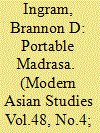

|
|
|
|
|
| Publication |
2014.
|
| Summary/Abstract |
In the first decades of the twentieth century, classically trained Muslim scholars (`ulama) of the influential Deobandi school of North India issued a number of immensely popular, mass-printed 'primers' on Islamic belief and ritual practice. Now ubiquitous in the Islamic bookshops in South Asia and elsewhere, these primers sought to summarize the rudiments of an Islamic education for a nascent lay Muslim reading public. Focusing on three Deobandi `ulama-Ashraf `Ali Thanvi (d. 1943), Mufti Muhammad Kifayatullah (d. 1952), and Muhammad Manzur Nu`mani (d. 1997)-this paper explores how their primers advanced the Deobandi school's well-known critique of popular piety even as they claimed to address Muslims generally, and how their authors negotiated the subtle dynamics of print. Understanding the potentially subversive power of print to open a space for readers to form their own interpretations of minute doctrinal matters and the threat of mass-printed religious texts to their own authority, these `ulama implored readers to refrain from forming their own opinions of the primers' content and to consult the `ulama throughout the reading process. Thus, even as they took advantage of print's possibilities, they remained deeply suspect of its ramifications.
|
|
|
|
|
|
|
|
|
|
|
|
|
|
|
|
| 13 |
ID:
132028
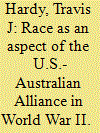

|
|
|
|
|
| Publication |
2014.
|
| Summary/Abstract |
World War II marked a watershed for American diplomatic practice as the nation moved away from its traditional ideas of unilateralism toward a foreign policy based on the construction of foreign alliances and relationships. Many of those relationships continue to be a central part of American diplomacy and one of the strongest is the American relationship with Australia. Historical study of the American-Australian alliance traditionally focused on how the alliance came into being because of the economic relationship between the two powers or because of the exigencies of World War II in the Pacific. What emerged from these studies was an overly simplistic understanding of what was dynamic and complex relationship between two states who often found themselves at cross-purposes. This essay points to the presence of a shared sense of racial identity among the general populaces and how this was utilized by policymakers to ameliorate the contentious nature of the alliance during the war. The creation of the American-Australian relationship was often as much driven by ideas of how the world was ordered as it was by the reality of events facing the two states during the war.
|
|
|
|
|
|
|
|
|
|
|
|
|
|
|
|
| 14 |
ID:
084244
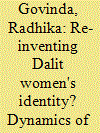

|
|
|
|
|
| Publication |
2008.
|
| Summary/Abstract |
Dalit or ex-untouchable women's voices and perspectives have been marginalized not only in Dalit movements but also in predominantly upper-caste Hindu-led women's movements. This paper aims at exploring the unheard voices and perspectives of Dalit women in the context of Dalit assertion in the state of Uttar Pradesh, north India. Scholarly writing examines the different facets of Dalit political assertion led by the Bahujan Samaj Party in Uttar Pradesh. Few scholars, however, examine the ways in which individual and organizational actors engage with women of Dalit castes through social activism in the state. This paper is an attempt to do so. Specifically, it examines, with special reference to issues of culture and identity, the engagement of a grassroots women's non-governmental organization with rural Dalit women in southern Uttar Pradesh. The paper begins with an enquiry into why engagement with issues of culture and identity is necessary for social activism with Dalit women, and how it is carried out. It then examines whether social activism and electoral politics with Dalit women cross-cut each other, and also what implications this or its lack has for the women. Finally, the paper asks how far activism and politics can go towards re-inventing Dalit (women's) identity.
|
|
|
|
|
|
|
|
|
|
|
|
|
|
|
|
| 15 |
ID:
146016
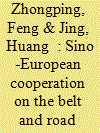

|
|
|
|
|
| Summary/Abstract |
The potential is large for China and Europe to further economic integration, the global order, and inter-civilizational exchanges through China’s One Belt One Road. Four features emerge from Sino-European cooperation on it: China initiates planning for the cooperation, connectivity is the focus, strategic cooperation on international order is on the horizon, and cooperation is multi-speed, multi-dimensional and open-ended. Any discussion of the drive, dynamics, and prospect of such profound cooperation will need to take into account benefits to both Europe and China, as well as hurdles and the impact of global trends.
|
|
|
|
|
|
|
|
|
|
|
|
|
|
|
|
| 16 |
ID:
113305
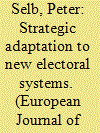

|
|
|
|
|
| Publication |
2012.
|
| Summary/Abstract |
How quickly, to what extent and under what conditions do voters and elites adapt to new electoral institutions in order to not waste their votes and effort on hopeless competitors? A latent-curve model of strategic adaptation is developed and fitted to district-level election data from Spain. The extent of strategic adaptation is generally found to vary with the strength of the electoral system. However, grave ethnic tensions are demonstrated to seriously retard adaptation even under favourable institutional conditions.
|
|
|
|
|
|
|
|
|
|
|
|
|
|
|
|
| 17 |
ID:
133813
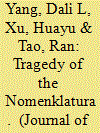

|
|
|
|
|
| Publication |
2014.
|
| Summary/Abstract |
We review James Kung and Shuo Chen's study, published in the American Political Science Review, on the causes of China's Great Leap Famine (1959-1961). Kung and Chen explain the variations in provincial leaders' radicalism on the basis of the career incentives facing the provincial First Secretaries. In this article, we question the validity of their basic assumptions and also uncover serious issues with the Kung and Chen dataset. We conclude that their empirical findings were based on faulty foundations. Our alternative hypothesis instead explains the dynamics of political radicalism during the Great Leap Forward in terms of the provincial leaders' political loyalty to Mao. Our findings point to the significance of political networks in influencing the behavior of elites and, by extension, political and socio-economic outcomes.
|
|
|
|
|
|
|
|
|
|
|
|
|
|
|
|
| 18 |
ID:
133242
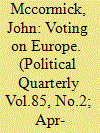

|
|
|
|
|
| Publication |
2014.
|
| Summary/Abstract |
As Britain prepares for a possible referendum on continued membership of the European Union, it is essential that more careful thought is paid to the dynamics of referendums. Polling data reveal the existence of a substantial knowledge deficit in the UK and other parts of the EU: large numbers of voters simply do not understand the EU. There is also reason to question the conventional view that voters can correct for such a deficit by using cues from opinion leaders and the media. The experience of recent referendums in other EU member states suggests that many voters will take part in the proposed British referendum without independent and informed knowledge of the issues at stake, that many will have been swayed by partisan elite opinion, and that many will decide on the basis of their views about domestic politics rather than their views about Europe.
|
|
|
|
|
|
|
|
|
|
|
|
|
|
|
|
|
|
|
|
|